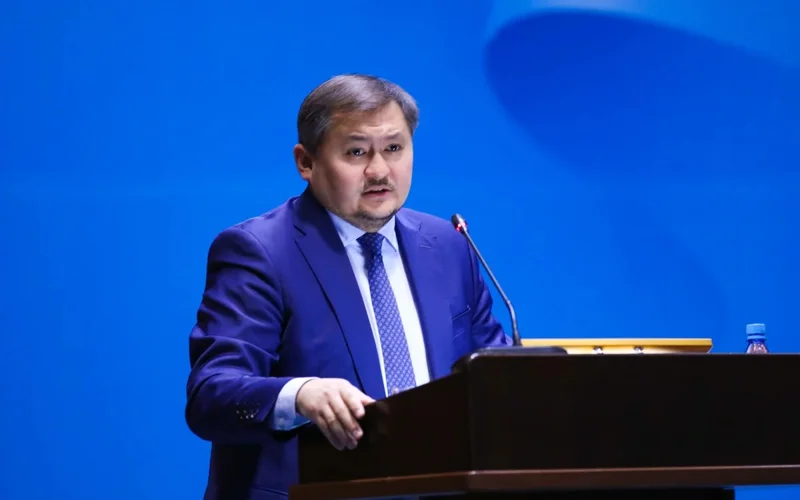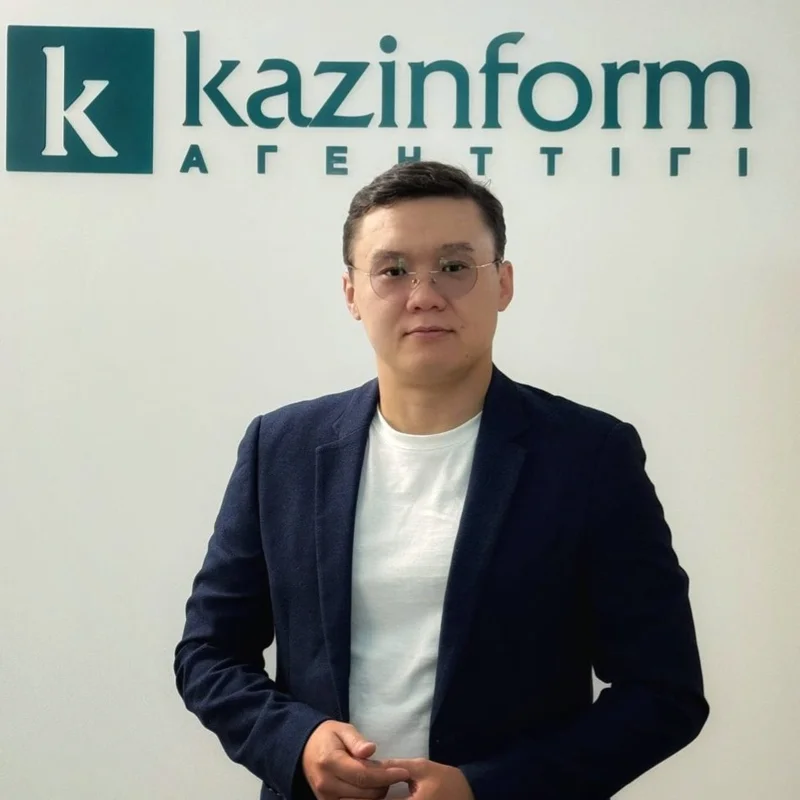The president is shaping a new intellectual map of Kazakhstan on the global stage — Sayasat Nurbek
President Kassym-Jomart Tokayev’s working visit to New York was marked not only by important political and economic negotiations but also by a series of strategic meetings aimed at developing Kazakhstan’s human capital, reports a Kazinform News Agency correspondent.

The Head of State held talks with leaders of the global academic and scientific community, laying the foundation for breakthrough projects in education and science. Why education is becoming a key element of high-level diplomacy and what concrete results these meetings will bring to Kazakh students, scientists, and the entire country, we discuss with the Minister of Science and Higher Education of the Republic of Kazakhstan, Sayasat Nurbek.
— In the President’s busy agenda in New York, special attention was given to education and science. Why is this sphere, along with the economy and geopolitics, being elevated to the level of presidential diplomacy?
— In the 21st century, the main capital of nations is not natural resources but people, their knowledge, competencies, and ideas. The Head of State, Kassym-Jomart Tokayev, consistently advances the concept that investments in human capital are the most important and profitable investments in the country’s future. A strong education system and advanced science are the foundation of national competitiveness, technological sovereignty, and sustainable economic growth.
When the President personally negotiates with leaders of the world’s educational and scientific elite, it sends a clear signal both domestically and abroad. Inside the country, it demonstrates that the development of education is a nationwide priority of the highest level. For international partners, it signals that Kazakhstan is a serious and reliable player, ready for deep integration into the global academic space and the implementation of the most ambitious joint projects.
In conditions of global competition for talent, we cannot develop in isolation. That is why the President personally opens the doors of the world’s leading knowledge centers to Kazakhstan. His participation elevates dialogue from ordinary interdepartmental cooperation to the level of strategic partnership, backed by the political will and guarantees of the Head of State. This allows us to tackle challenges of an entirely different scale.
— Please tell us about the most significant agreements reached during the visit. In particular, the meetings with the leadership of the Smithsonian Institution and Educational Testing Service (ETS) attracted great interest.
— Yes, these two meetings are truly groundbreaking for our science and education system.
The first meeting was with the renowned Smithsonian Institution, one of the oldest and most authoritative research and museum complexes in the world. An agreement was reached to launch a specialized training program for our leading scientists within the Bolashak program. This is a unique opportunity for Kazakh anthropologists, cultural experts, historians, and representatives of other humanities and natural sciences to gain access to unique archives, laboratories, and, most importantly, world-class expertise. This will allow us to integrate Kazakh science into global research projects and elevate our humanities research to a new qualitative level.
The second, and I would say even more important meeting for the entire education system, was with the leadership of ETS (Educational Testing Service). This is the world’s oldest and leading testing company, the developer of such global tests as TOEFL and GRE. Following the meeting, a special working group will be created. Under the guidance and with the involvement of ETS’s top specialists, the methodology and content of our Unified National Testing (UNT) will undergo a thorough overhaul.
This is a multi-stage, complex process, the ultimate goal of which is to transform the UNT into a modern, internationally recognized test, based on advanced methodology and the highest quality of test assignments. This is a fundamental step toward ensuring academic integrity, creating equal opportunities for all graduates, and increasing the objectivity of the entire university admission system.
— Beyond these two landmark meetings, what general strategy is Kazakhstan promoting in the international educational arena? Are we talking about further expanding academic ties with the U.S.?
— Absolutely. The strategy being implemented by the Head of State is to build a global educational ecosystem in Kazakhstan. We are moving from simply sending students abroad to creating centers of academic excellence within the country. The visit to the U.S. is an important part of this strategy.
First, it is about attracting leading American universities to Kazakhstan. The President has set the task of opening branches of authoritative foreign universities. We already have a successful example with the University of Arizona in Petropavlovsk. Negotiations in New York focused on expanding this experience. The arrival of such universities is not only prestigious. It means the transfer of the best educational programs, management technologies, and research practices, as well as the creation of a competitive environment for our domestic universities.
Second, it is about developing joint scientific research. We are interested in creating joint laboratories and research centers with American universities in such priority areas as artificial intelligence, biotechnology, and green energy. This will allow our scientists to work at the forefront of global science without leaving the country and to commercialize their developments.
Third, it is about integration into global educational platforms. We are actively discussing cooperation with giants such as Coursera so that the best global online courses become available to our students, while Kazakh universities can place their programs there, promoting our educational product on the global market. The goal is to create an open and dynamic system where knowledge has no borders.
— You repeatedly emphasize the President’s role. What exactly is the effect of his personal involvement? After all, many of these issues could be addressed at the ministry level. What does the Head of State’s participation change?
— The personal involvement of the Head of State is a powerful catalyst and has a multiplier effect. I would highlight three key aspects.
The first is status and trust. When the President of Kazakhstan personally meets with the rector of a leading university or the head of a scientific organization, it elevates the dialogue to the highest strategic level. It demonstrates to our partners that the declared reforms and projects are not just an initiative of one department but a long-term state priority, backed by the highest political will. This resolves many questions and doubts, accelerating decision-making.
The second is the strategic framework. The President does not just discuss individual projects. He presents a holistic vision of Kazakhstan’s future as a regional educational and scientific hub. He links the development of education with the tasks of a new economic model, the need to prepare personnel for Industry 4.0, and the goals of sustainable development. This comprehensive approach allows our partners to see the bigger picture and their place in it, making cooperation more meaningful and large-scale.
The third is the resolution of complex interdepartmental issues. Implementing large educational projects, such as opening a branch of a foreign university, requires coordinated actions from various ministries and agencies — from land allocation and construction to migration and tax legislation. The President’s involvement makes it possible to promptly remove any barriers and ensure a “green light” for strategically important initiatives. His role is that of the chief architect and guarantor of these complex but vital transformations for the country.
— How will all these high-level agreements affect the lives of ordinary Kazakh students, teachers, and scientists? What practical results will they get?
— This is the most important question because the ultimate goal of all these efforts is the well-being and self-realization of our citizens. The results will be felt on several levels.
For students, the reform of the UNT with the help of ETS means a fairer, more objective, and transparent university admission system. It means reduced stress and greater trust in national testing. The opening of branches of leading foreign universities means the opportunity to obtain a world-class diploma without leaving Kazakhstan, which is much more accessible. And integration with Coursera and other platforms will provide access to thousands of courses from the world’s best professors, allowing them to build individual educational trajectories.
For scientists and teachers, partnerships with the Smithsonian Institution and other centers open unique opportunities for internships, joint research, and publications in leading international journals. This is a direct path to big science. The arrival of foreign universities will create a competitive environment, leading to higher salaries, improved working conditions, and higher academic standards throughout the system.
For the country as a whole, we will gain a new generation of specialists trained to international standards and capable of solving the most complex challenges facing our economy. The development of science and technology will lead to the emergence of innovative companies and the creation of new jobs. Kazakhstan will strengthen its status as a regional leader in education and science, enhancing our overall attractiveness and competitiveness in the world.
Ultimately, all these steps initiated by the President work toward building an intellectual nation and creating a Just Kazakhstan, where the social elevator operates through knowledge and talent.
Earlier Kazinform reported that President Kassym-Jomart Tokayev is on a working visit to New York.
